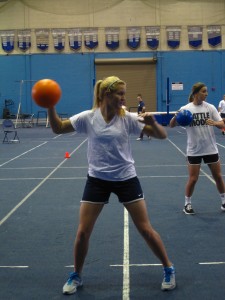
It is safe to say that college life for BYU softball outfielder Carly Duckworth is built around the sport she loves. While she attends classes like any other student, she also practices for four to five hours each day. This is, after all, what it takes to compete at the college level, and win.
But the hours — and life — spent in dedication to a sport can mean preparation for life beyond competition doesn’t happen.
A recent study published by Sports Illustrated in March 2012 showed 78 percent of NFL players and 60 percent of NBA players go bankrupt shortly after retirement. Trevor Wilson, director of the Athletic Advisement Center, is someone trying to make sure these statistics don’t affect BYU’s athletes. He believes the scope of his job goes beyond keeping athletes eligible to play.
“Our job really doesn’t end until (student-athletes) are securely in a career and self-reliant,” Wilson said. “It’s more than just college. These are life skills that also come along with student athletes that, I feel, we have the responsibility to teach.”
The process Wilson has designed for athletes mirrors what he learned from visits with the Marriott School. Once students have entered the program, they begin a process of learning career-finding skills that will land them a job after graduation.
This year, Wilson began a three-phase process which helps prepare athletes for life after their sport. The phases consist of career workshops, labs and fairs. So far the results have been positive.
“It started slow,” Wilson said. “This (career) culture wasn’t here. Now we’re starting to get really good numbers out of these workshops because there’s momentum.”
Without the necessary tools, most athletes’ focus is naturally on the sport they’ve been practicing most of their lives. For this reason, the administration has worked hard to make sure athletes are prepared to leave the university.
BYU football coach Bronco Mendenhall said he knows his players have the goal to be in the NFL, and he said he wants them to be leaders if they make it there. However, according to Lamar C. Campbell, who wrote the article, “For retired NFL players, the most challenging ‘season’ is just beginning,” the average retirement age of an NFL player is 28. Mendenhall wants his players to know they have 50 years of life afterwards.
“I’ve been really trying to help our players see that perspective,” Mendenhall said. “I really do focus a lot on the educational component, just making sure they know the numbers. … I think (the NFL) is a great thing if they can be one of the 30 percent that play three years or longer and stay away from all the things that are hard and problematic that many leave the league with.”
He said the new career path offered by BYU is a way to educate players about their future lives and how much life there is to live after football or any sport. He also said it helps them afterward to use skills they’ve learned.
“Football can be, really, a vehicle to prepare them for (life),” Mendenhall said. “The NFL is the same. So our program and the NFL can help them prepare for life, but it’s not an end-all. It’s just a way to become someone of true substance and potential.”
As athletes get closer to the end of their athletic careers, they come to this realization and need to understand how to reach their potential. Athletes can be caught off-guard, but this program is trying to prevent that.
“At the beginning of this year, I was really nervous,” Duckworth said. “I was coming into my junior year and I had figured out my major, but I needed to look past that to what I am going to do after college.” To do so, Duckworth harnessed what the Athletic Advisement Center offers student athletes.
Duckworth explained with the introduction of the career path she became excited because it was exactly what she needed. She has attended all the sessions and has found a path after college that excites her. She said one thing she learned was how to leverage her experience to employers.
“You learn so much through athletics like teamwork, hard work, being coachable and time management,” Duckworth said. “All these different skills that we’ve learned can translate over to an occupation. Just helping us to recognize that was really helpful because I always thought I’d been at a disadvantage.” And the opportunities for student-athletes to learn how to transition continue to ramp up.
“The Student-Athlete Academic Center will continue conducting these workshops next semester,” Associate Athletic Director Janie Penfield said. “Some teams have established mentor relationships to assist with the transition from college to the professional ranks.”
For now, Duckworth continues her life of morning classes, afternoon practices and evenings in the Student Athlete Building. But she feels her future outside of sports is more secure now.




